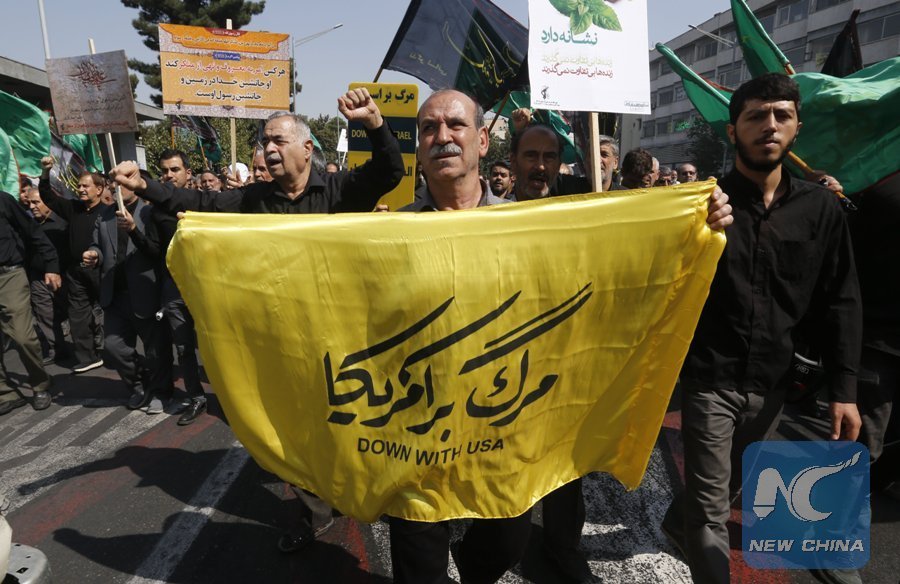
File Photo: Iranians take part in a protest against U.S. President Donald Trump's speech at the United Nations general assembly, in Tehran on Sept. 22, 2017. (Xinhua/AFP)
by Xinhua writer Liu Chen
WASHINGTON, Jan. 11 (Xinhua) -- U.S. President Donald Trump is set to decide Friday whether to reimpose economic sanctions on Tehran, a move that may put the landmark Iran nuclear deal in peril.
As a diplomatic breakthrough reached between six major countries and Iran in 2015 after a decade of talks, the deal has been proven effective in deterring Iran's nuclear development, bolstering stability in the Middle East and upholding the international non-proliferation regime, especially at such a delicate time.
Although the treaty might not be perfect, it remains worthy of preserving. The accord has provided "clear and tangible" benefits on limiting Iran's nuclear program, according to a recently released report by U.S. think tanks.
Under the deal, Iran would need roughly a year, instead of less than two months, to produce enough fissile material for a nuclear weapon, giving the international community enough time to detect any major clandestine nuclear effort, said the report, which is co-authored by the Carnegie Endowment for International Peace and Center for a New American Security.
In nine reports since the pact was inked, the International Atomic Energy Agency, the international non-proliferation watchdog, has confirmed that Tehran has been in full compliance with the deal, rebutting the accusation from Washington of the Islamic Republic's "multiple violations of the agreement."
In fact, the United States is the only party that has threatened to scrap the deal, a stance that has been confronted by other participants.
Shortly before Trump was expected to announce his decisions, diplomats from Britain, France, Germany and the European Union again called on Trump to uphold the pact.
French President Emmanuel Macron emphasized the importance of abiding by the deal "in order to guarantee better stability in the Middle East," according to a readout of his telephone conversation with Trump on Thursday.
British Foreign Secretary Boris Johnson said those who oppose the nuclear agreement should come up with a better solution, "because we haven't seen it so far."
He gave the remarks alongside his German and French counterparts as well as EU foreign policy chief Federica Mogherini after meeting Iran's Foreign Minister Mohammad Javad Zarif in Brussels on Thursday.
On the same occasion, German Foreign Minister Sigmar Gabriel said the European signatories of the Iran deal "want to protect (the deal) against every possible decision that might undermine it."
Meanwhile, China and Russia, the other two parties in the pact, have also repeatedly urged parties to preserve the deal, which is "a beneficial practice of solving a critical issue through political and diplomatic means."
While the Iran accord may be imperfect in that it includes a "sunset clause" that allows Iran to restart its uranium enrichment program after 2025, so long as Iran complies with it, it remains the best mechanism available.
Preventing the deal from falling apart is especially meaningful at a time when nuclear tensions are still high on the Korean Peninsular despite the recent ice-breaking dialogue between the two Koreas.
"Ending the Iran deal is an invitation to war," Ilan Goldenberg and Mara Karlin, two former Pentagon officials who have worked in Iran, warned in an article published in The Atlantic magazine in October.
Given that Iran has said it would no longer abide by the pact if the United States renews its sanctions, Trump's decision to nullify the arms control deal would very likely lead to Tehran never returning to the negotiating table and freeing itself of its nuclear obligations set by the deal.
In fact, America's own strategic interests will be best served by keeping the pact intact.
Scrapping the deal now would remove important existing constraints on Iran's nuclear program, and would leave the United States in a far weaker position to negotiate meaningful future limits on the program, said the U.S. think tank report.
A unilateral U.S. withdrawal from the Iran deal would be another blow to America's diplomatic credibility, which has already been damaged after its multiple "retreats" from the international organizations and commitments last year.

